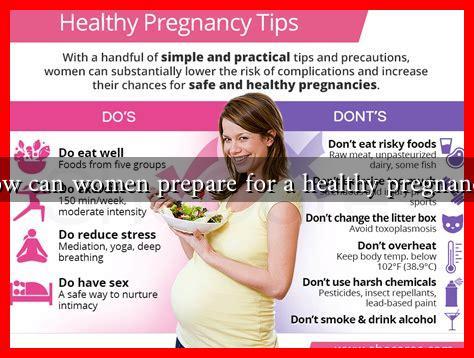-
Table of Contents
How Can Women Prepare for a Healthy Pregnancy?
Preparing for a healthy pregnancy is a crucial step for women who are planning to conceive. A well-planned approach can significantly enhance the chances of a smooth pregnancy and a healthy baby. This article outlines essential steps women can take to prepare for a healthy pregnancy, focusing on nutrition, lifestyle changes, medical check-ups, and mental well-being.
Nutrition: The Foundation of a Healthy Pregnancy
Nutrition plays a vital role in preparing the body for pregnancy. A balanced diet rich in essential nutrients can help ensure that both the mother and baby are healthy. Here are some key dietary recommendations:
- Folic Acid: Women should start taking folic acid supplements at least three months before conception. Folic acid helps prevent neural tube defects in the developing fetus.
- Balanced Diet: Incorporate a variety of fruits, vegetables, whole grains, lean proteins, and healthy fats into your diet. This ensures that you receive all necessary vitamins and minerals.
- Hydration: Staying hydrated is essential. Aim for at least 8-10 glasses of water daily to support overall health.
- Avoid Harmful Substances: Limit caffeine intake and avoid alcohol, tobacco, and recreational drugs, as these can negatively impact fertility and fetal development.
According to the Centers for Disease Control and Prevention (CDC), women who consume a healthy diet before and during pregnancy are more likely to have a healthy pregnancy outcome.
Lifestyle Changes: Creating a Supportive Environment
Making certain lifestyle changes can significantly impact a woman’s health and readiness for pregnancy. Consider the following:
- Regular Exercise: Engaging in regular physical activity can help maintain a healthy weight, reduce stress, and improve overall well-being. Aim for at least 150 minutes of moderate exercise each week.
- Weight Management: Achieving a healthy weight before pregnancy can reduce the risk of complications such as gestational diabetes and hypertension.
- Sleep Hygiene: Prioritize getting enough sleep. Aim for 7-9 hours of quality sleep each night to support hormonal balance and overall health.
For example, a study published in the journal Obstetrics & Gynecology found that women who maintained a healthy weight and engaged in regular exercise had a lower risk of pregnancy complications.
Medical Check-Ups: Ensuring Optimal Health
Before trying to conceive, women should schedule a preconception check-up with their healthcare provider. This visit can help identify any underlying health issues that may affect pregnancy. Key components of this check-up include:
- Medical History Review: Discuss any chronic conditions, medications, or previous pregnancy complications with your doctor.
- Vaccinations: Ensure that vaccinations are up to date, particularly for rubella and varicella, to protect both mother and baby.
- Genetic Screening: Consider genetic counseling if there is a family history of genetic disorders.
According to the American College of Obstetricians and Gynecologists (ACOG), preconception care can significantly improve pregnancy outcomes.
Mental Well-Being: Preparing Emotionally for Pregnancy
Emotional health is just as important as physical health when preparing for pregnancy. Here are some strategies to enhance mental well-being:
- Stress Management: Practice stress-reduction techniques such as yoga, meditation, or deep-breathing exercises.
- Support Systems: Build a strong support network of family and friends who can provide emotional support during the pregnancy journey.
- Professional Help: If experiencing anxiety or depression, consider seeking help from a mental health professional.
A study published in the journal BMC Pregnancy and Childbirth found that women who engaged in mental health support had better pregnancy outcomes.
Conclusion: Key Takeaways for a Healthy Pregnancy
Preparing for a healthy pregnancy involves a multifaceted approach that includes proper nutrition, lifestyle changes, medical check-ups, and mental well-being. By taking proactive steps, women can enhance their chances of a smooth pregnancy and a healthy baby. Key takeaways include:
- Prioritize a balanced diet rich in essential nutrients.
- Engage in regular physical activity and maintain a healthy weight.
- Schedule a preconception check-up to address any medical concerns.
- Focus on mental well-being through stress management and support systems.
By following these guidelines, women can lay a strong foundation for a healthy pregnancy and a positive parenting experience.

